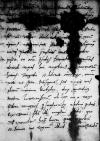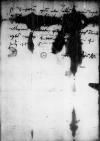Letter #290
Andrzej KRZYCKI (CRICIUS) to Ioannes DANTISCUSGdańsk (Danzig), 1526-07-04
| received Granada, [1526]-11-14 Manuscript sources:
Auxiliary sources:
| ||||||
Text & apparatus & commentary Plain text Text & commentary Text & apparatus
Magnifico Domino
Salutem et sui commendationem.
Venimus tandem ad liberandas oves vestras perditas, quarum lupos a paper damaged⌈[s a]s a paper damaged⌉lios abigemus, alios, sed paucos mactabimus paper damaged⌈[us]us paper damaged⌉. Quae paper damaged⌈[Quae]Quae paper damaged⌉ hic portenta invenimus, de quibus longum esset scribere, frater vester omnia declarabit.
Nunc hoc unum agimus, ut
Omnia recte, ut spero, transigentur, sed angit nos plurimum
 BCz, 243, p. 48 corrumpatur. Mirum, quod summates isti, quorum interest paper damaged⌈[st]st paper damaged⌉, dormitant tam diu et Hydram [...] paper damaged⌈[...][...] paper damaged⌉ magis excrescere permittunt. De his, rogo, scribite aliquando, et quid de ipso matrimonio istic censeatur. Frater dicet reliqua.
BCz, 243, p. 48 corrumpatur. Mirum, quod summates isti, quorum interest paper damaged⌈[st]st paper damaged⌉, dormitant tam diu et Hydram [...] paper damaged⌈[...][...] paper damaged⌉ magis excrescere permittunt. De his, rogo, scribite aliquando, et quid de ipso matrimonio istic censeatur. Frater dicet reliqua.
Ille
 BCz, 243, p. 49 se
BCz, 243, p. 49 se
Optime valete et me diligite.
Vester



